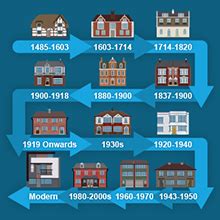Discover effective methods to trace property ownership, including historical research, construction records, and insights from local archives and previous owners.Have you ever wondered about the story behind your home? Knowing who built your house can unlock fascinating insights into its history and architecture. As a cherished space, understanding its origins not only deepens your appreciation but also connects you to the community and its development over the years. This blog post will guide you through the process of uncovering your home’s past, from researching its history to identifying the original owner. We’ll explore how to track down construction records, consult local archives, and even reach out to previous owners. Whether you’re a curious homeowner or a history enthusiast, these steps will help you piece together the story of your dwelling and the lives intertwined within it. Let’s embark on this journey of discovery and learn more about the history behind your address!
Research the History
When you want to uncover the origins of your home, a great starting point is to research the history. This process entails delving into various historical resources and documentation to gather information about the property.
Begin by exploring local libraries and historical societies. These institutions can provide valuable insights into the architectural styles and historical context of the area where your house is located. Look for old photographs, blueprints, or maps that could give clues about when your home was built and by whom.
It can also be beneficial to access land records. These documents often contain information about previous owners, which can help you to trace the lineage of ownership back to the original builder. Remember, every piece of information
Identify the Original Owner
One of the key steps in discovering the history of your home is to identify the original owner. This process can provide a window into the past, revealing not only the architectural style of your home but also the story of its inhabitants. To begin, you can consult a variety of records that are typically maintained by local governments or historical societies.
Start by checking the property deeds, which often include the names of the original owners. Many times, these documents are accessible through your local county recorder’s office. Look for the earliest deed related to your property—it should mention who purchased the land and when. Additionally, you may find that the ownership has changed hands numerous times through the years; tracking these transitions can help you piece together the story.
Another useful method is to explore census records and historical directories, which can give insight into who lived in your house and what their lives were like. Public census data may provide extensive information about the original owner, including family members, occupations, and significant events during their residency. This can be both fascinating and illuminating as you uncover the layers of history associated with your home.
Track Construction Records
Tracking the construction records of your house can be an enlightening experience that reveals the story of your home. These records hold vital information about the building process, such as initial blueprints, permits issued, and any significant renovations that may have occurred over the years.
To begin your search, you can visit your local building department. Many cities maintain archives of construction permits which detail who built your home, when it was built, and any legal documents related to the structure. This can often include important information such as the original specifications and materials used.
Additionally, a thorough examination of property records can provide insights into the building timeline. You may uncover fascinating details about changes made by previous owners or renovations that enhanced your home’s character. If you’re lucky, you might even find photographs or historical documents that give a glimpse into the early days of your house.
If your house is older, it may be beneficial to check the local library or historical societies for archives that could have relevant documents, such as *old newspapers or city directories*. These resources often contain valuable information on the construction and subsequent history of older homes. Tracking down construction records not only enriches your understanding of your house but also enhances your apprec
Consult Local Archives
When trying to uncover the history of your home, one invaluable resource to consider is your local archives. These repositories often house a wealth of information about historical properties, including property deeds, tax records, and building permits. By tapping into these records, you may be able to unearth significant details that can help you piece together the story of your home.
Local archives can be found in various locations, including public libraries, historical societies, and county courthouses. Here is a quick guide on what you might find in these archives:
| Type of Record | Description |
|---|---|
| Deeds | Legal documents that outline the transfer of property ownership, providing insights into previous owners. |
| Tax Records | Records that can show changes in property value and ownership over time, which may correlate to historical events. |
| Building Permits | Documents that detail any renovations or constructions, revealing alterations made to the original structure. |
Furthermore, local archives may also preserve maps, photographs, and census data that can help paint a clearer picture of the neighborhood’s evolution. Many archives have moved to digitize their records, making it easier than ever to search for information online. However, visiting in person can yield even more treasures, as you may encounter items not yet available in digital format.
Contact Previous Owners
One of the most valuable methods to uncover the history of your home is to contact previous owners. Speaking with them can provide insights that may not be recorded in public documents or local archives. Previous owners often have stories, memories, and even photographs that can help paint a more vivid picture of your home’s past.
When reaching out, it’s important to approach the conversation with respect and sensitivity. You might consider creating a list of specific questions to help guide the discussion. Here are some potential questions you could ask:
- When did you purchase the home and from whom?
- What renovations or changes did you make during your time there?
- Were there any unique events or stories that stand out from your time living in the house?
- Do you have any old photographs or documents related to the home?
By engaging with previous homeowners, you can gather valuable information that adds depth to your understanding of the property. It’s an excellent opportunity to connect with individuals who once called your house their home, enriching your present experience with historical context.
Frequently Asked Questions
What is the main purpose of the article?
The article aims to guide readers on how to find out who built their house using the property’s address.
Why is it important to know who built your house?
Knowing who built your house can provide insights into its construction history, quality, and any renovations or repairs that may have been done.
What resources can I use to find information about the builder?
You can use public records, local building departments, online databases, and historical societies to gather information about the house’s builder.
Can I find out if my house has had multiple owners?
Yes, property records typically include ownership history, allowing you to see if there have been multiple owners since the house was built.
What should I do if I can’t find any information about the builder?
If you cannot find information through public records, consider consulting a local historian or a real estate professional who may have access to additional resources.
Is there a cost associated with accessing building records?
Some building records may be available for free, while others could require a small fee or a formal request to access.
How can I verify the accuracy of the information I find?
Cross-reference multiple sources such as building permits, property tax records, and historical information to confirm the accuracy of the information regarding your house’s builder.





